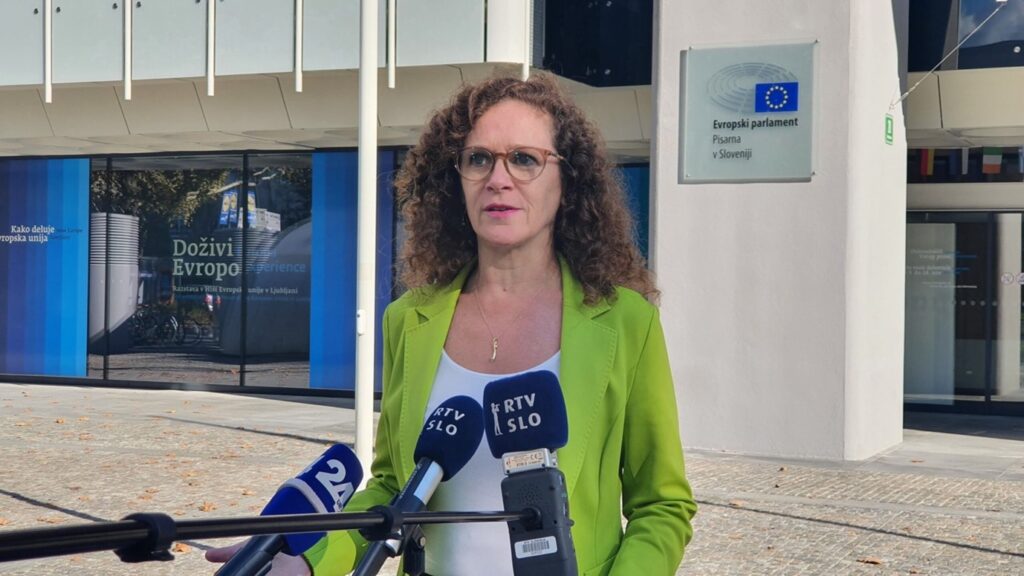A special fact-finding group from the European Parliament visited Slovenia this week in order to check what is going on in our country in person. The leader of the mission, Sophie in ‘t Veld, emphasised that the delegation’s intention was not to overthrow the government but to establish the facts. “Our task is to monitor the situation here; we will not be imposing sanctions and measures,” the chairwoman of the European Parliament’s Democracy, Rule of Law and Fundamental Rights Monitoring Group pointed out, adding that they will remain absolutely impartial. In practice, their impartiality looks like this: they are mainly talking to the opponents of the current government and do not even bother to ask the rest about things they do not want to hear.
As we have already reported, Sophie in ‘t Veld and her delegation from the European Parliament came to Slovenia to get a “complete and comprehensive picture of both sides” regarding the state of the rule of law, freedom of the media, and fight against corruption. Namely, they are also interested in the government’s alleged financial exhausting of the Slovenian Press Agency and the fact that Slovenia did not appoint two delegated prosecutors to the European Public Prosecutor’s Office. Well, things apparently already came to a halt during the delegation’s researching of the Slovenian Press Agency situation – namely, director of the Government Communication Office, Uroš Urbanija, who has been heavily involved in dealing with the agency, tweeted that he was not invited to the discussion about this topic. “I guess it is enough to only meet with professor Milosavljević from the Faculty of Social Sciences if you want to get a clear picture about the Slovenian Press Agency situation,” he added.
A draft of the delegation’s programme is available online; however, there is no information available on who was invited to the discussion, nor is there any information about who attended the talks about the Slovenian Press Agency that happened on Thursday. The only two people mentioned in the programme for Thursday are the president of the Court of Audit Tomaž Vesel and the president of the Constitutional Court, professor Dr Drajko Knez. We did, however, receive the information that the internationally renowned legal expert Dr Matej Avbelj also attended the discussion, who told us that he joined Dr Žiga Turk and Dr Marko Milosavljević. “The conversation was correct, but very general, limited especially to the posts on Twitter, which I do not follow myself,” Avbelj said, adding that the rule of law as a systemic legal problem in Slovenia, to which he himself also drew attention in the past, was practically not discussed. He believes that happened, among other things, because people who are not lawyers generally do not really understand this problem. “I myself presented my otherwise publicly known views clearly. The delegation took note of them,” he added.
The media in Slovenia are mostly unbalanced and unprofessional
Regarding the situation in the Slovenian media, Avbelj already said some time ago that they are very unbalanced, which stems from historical reasons and the skewed distribution of economic and political power. He assessed that the right was severely deprived in this field. “But even more than this imbalance, I am worried about the extreme unprofessionalism. Extreme unprofessionalism. Because in Slovenia, we sometimes do not even follow any standards in public and professional debates anymore, or perhaps even adapt our standards to what one or the other political side wants to hear,” he added. He also pointed out that during the epidemic, all of us in the Republic of Slovenia were caught in a bubble, where we witnessed some hysterical, often very fan-like reporting. “Dare I say it, some of it might even be considered propaganda,” he added.
In this environment, difficult people, lawlessness, stupidity and primitivism seem to flourish
“Slovenia is a country which, despite all of its legal bureaucracy, is de facto without law. There are tons of rules and regulations, and as our Constitutional Court insists, all these rules must also be squeezed into legal acts. But for whom, I ask you? The state does not even respect its own regulations. And as we have seen countless times before, nothing ever really happens the difficult people who do not follow the regulations either,” the professor of European law wrote in an article for the newspaper Finance. He pointed out that Slovenia is thus facing “Balkanisation” in every sense of the word. In cultural terms, from the point of view of legal, political, economic, and even the truly basic social culture, we are part of the Balkans. Our social system has also become completely “Balkanised,” and it has now disintegrated into a million pieces. “Those who are responsible for building a healthy public space and who should constantly be taking care of its maintenance: the state institutions, politics, media, civil society, schools and universities, each in its own way and each from its own side – with one being clearly more dominant than the other – are actually doing everything they can to make sure that Slovenian democracy is further becoming more and more flat, profane, toxic, banal, divided and fragmented,” he criticised the situation in our country.
Sara Bertoncelj


